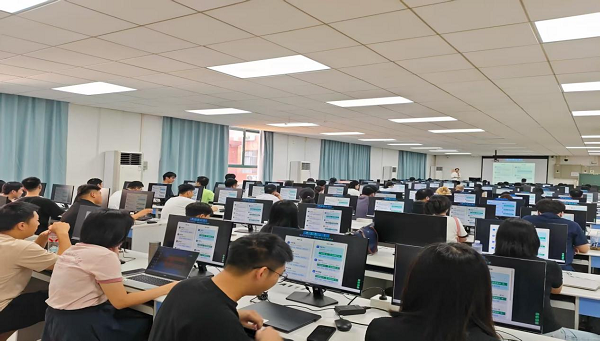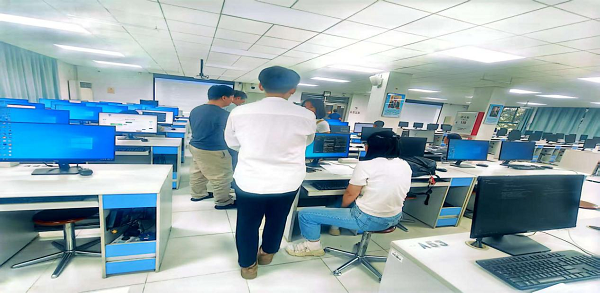
Latest >
- Volunteers from GCUT took an active part in the 15th National Games of the People's Republic of China
- GCUT made new breakthroughs in the 19th “Challenge Cup” National College Student Extracurricular Academic and Technological Works Competition
- GCUT made a breakthrough in the 2025 China Undergraduate Mathematical Contest in Modelling
- GCUT held its first AI workshop for its faculty to promote deep integration between AI technologies and teaching
- A new breakthrough: a course offered by GCUT was first selected as a national first-class undergraduate one
- GCUT held the 2025 Opening Ceremony for Freshmen
- GCUTers won national first prize in the 18th China Collegiate Computing Contest
- GCUTers won national second and third prizes in the 16th "Lan Qiao Cup" Contest of National Software and Information Technology Talents Final
- GCUT's 2025 Graduation Ceremony: May you keep striving for what you desire
- GCUT held a lecture themed on "effective communications empower one's growth"
GCUT held its first AI workshop for its faculty to promote deep integration between AI technologies and teaching
Time:2025-10-11 Page views:10
To implement the Training Program of AI Talents of Guangzhou City University of Technology (2025-2030) and improve its faculty’s competence of applying AI technologies into teaching innovation, GCUT’s School of Electrical Engineering held the first AI workshop for its faculty in the Room 203 of the Computer Lab Center of the Teaching Building No.5 on September 22, which is coordinated by its Academic Affairs Office and co-organized by GCUT’s School of Computer Engineering and Big Data.
Themed on Design of Teaching Cases Integrating with AI -- Load Forecasting of Regional Power Grid, the workshop attracted faculty from GCUT’s various schools. It aims to explore effective approaches to achieve deep integration between AI and professional courses based on case analyses and pragmatic skills.
The workshop centers around the training goal of “understanding application scenarios, learning design methods and inspiring innovation”. The lecturer, Ke Nan, a faculty from GCUT’s School of Electrical Engineering, expounded the design of “AI + cases of course reforms” through analyzing how to select appropriate cases of machine learning integrating actual courses combined with the case of Load Forecasting of Regional Power Grid. He shared his experience from the starting point of teaching, strategies of implementing the design, to the evaluation of teaching effects, which provides clear and effective design approach to present faculty.

Ke Nan illustrated how to use cloud server
Concerning the part of “case study and its implementation”, the training contents were extended from theories to technologies. Ke Nan showed how to establish machine learning projects on the cloud server with details, and explained the whole process of uploading it step by step. Such hands-on demonstration enables faculty to form a direct and deep understanding of the implementation of AI projects, thus breaking down barriers between theoretical teaching and technological applications.

As for the part of “exchanges and case design of courses”, present faculty played an active part in trying to write primary teaching cases integrating with AI combined with what they have learned from the workshop. Ke Nan and Li Jinli from GCUT’s School of Computer Engineering and Big Data provided individual tuition and answered their questions. They also explored common problems especially how to integrate AI into liberal arts and how students without computer programming skills master it in a short time.
The workshop is not only a skill training, but an exchange of teaching innovation. Present faculty shared that they have a better understanding of applying AI technologies in teaching applications, which provides valuable lessons for their future reform and innovation of courses.
GCUT will keep holding series of thematic workshop on AI boosting teaching in the future, thus helping to promote deep integration between artificial intelligence and education as well as teaching. In this way, it can inject new momentum for cultivating quality application-oriented talents.




